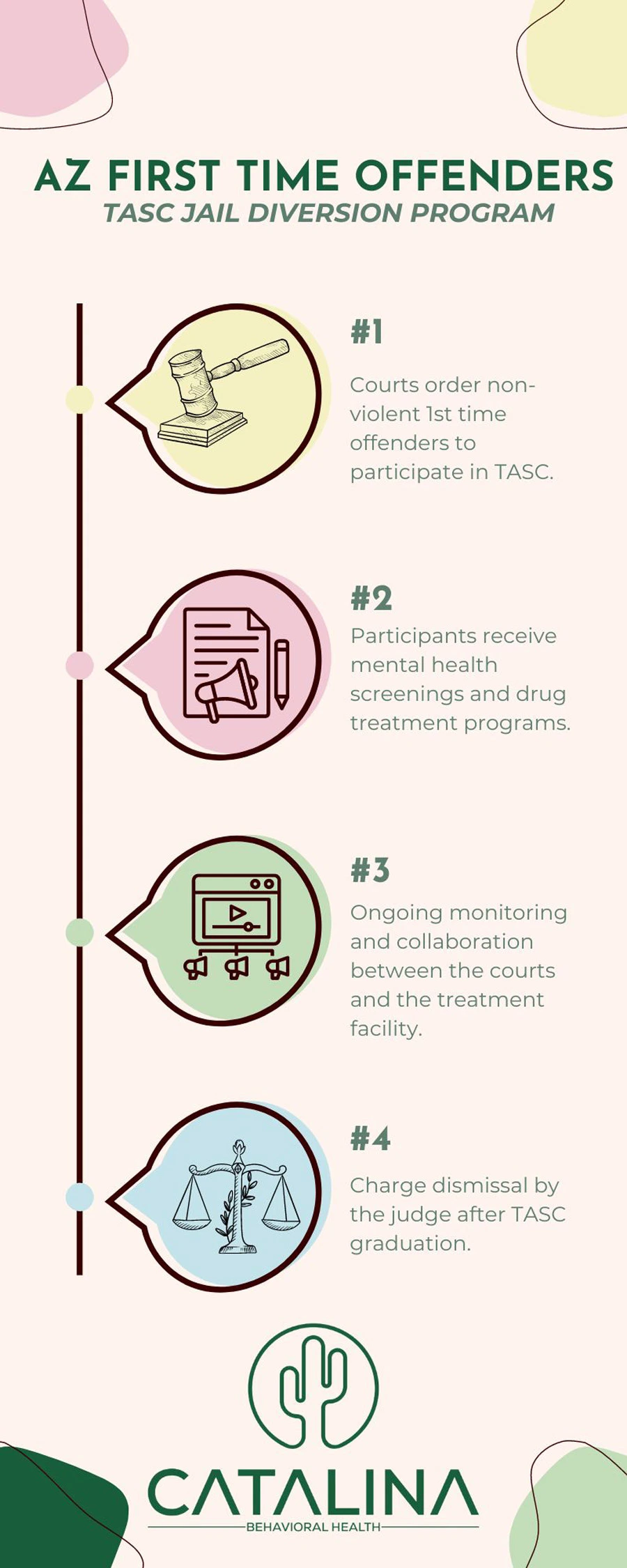Guidance and Options for Seeking Treatment to Lessen Charges
Getting charged with drug possession can be an incredibly frightening experience, especially for first-time drug offenders who haven’t had past interactions with Arizona law enforcement or its court system. You know you must be proven guilty beyond a reasonable doubt when facing criminal charges.
But being an honest person, you know that you did have drugs in your possession. What can a first time drug offender in Arizona expect to happen next?
Here at Catalina Behavioral Health in Tucson, we’ve provided rehabilitation services to many in this situation. In many Arizona court systems, a petty offense, such as simple possession, can have charges reduced. Our program works with the local authorities to help you get the best possible outcome – avoid jail and get help for your drug use.
If you are a first- or second-time offender facing a criminal case, we urge you to keep reading. Our treatment program may be an excellent option for you.
Get Accredited Treatment Programs at Catalina
Arizona Law and First-Time Drug Possession Cases
First-time offenders in Arizona are subject to several potential sentences, depending on the specific drug charges and whether the state considers it a dangerous drug.
Minor Drug Possession Charges in Arizona
Minor drug offenses often result in probation, a mandatory treatment program (usually outpatient), or jail diversion programs. These can be outcomes for people who have committed a first offense without the complications of previous convictions. A past felony conviction can be a deal-breaker for many AZ judges.
Some minor charges include an arrest for drug possession or possession of paraphernalia for personal use.
Possible sentences for a first-time offender with minor charges can include:
- Community service
- TASC Diversion Program
- Treatment (alternatives to jail time)
- Home arrest
- Drug education programs
- Probation, which usually includes random drug and alcohol testing.
Simple first-time drug possession charges in Arizona are likely to result in avoiding the most severe penalties. At this point, the court prefers to help people in trouble get help to avoid future entanglements with the law.
Harvard Law School and many criminal defense attorneys agree with this first-offense approach. They argue that recidivism rates drop after a treatment program, and a first-time drug offense can be a growth opportunity.
TASC (Treatment Assessment Screening Center) Diversion Program

TASC is an alternative program to help first-time offenders get help with resolving drug cases without serving time in jail. The program recognizes that many first-time drug possession charges mean an opportunity to provide help to someone who is struggling.
Participants must successfully complete the program to receive leniency from the courts. The program guidelines are:
- TASC Diversion Program is only available to first-time, non-violent offenders. The county prosecutor recommends it to the court.
- Participants receive an initial addiction assessment and receive an appropriate treatment program recommendation.
- The legal process continues, with close compliance monitoring and communications between the treatment facility and court administrators.
- Upon completion of the TASC program, the judge usually dismisses the charges. The participant has no criminal record and has been healed of the drug problem.
If a participant does not follow through with the requirements of TASC, the courts will remove them from the program and move forward with the trial and conviction.
Possession of Dangerous Drugs and More Serious Consequences
More severe consequences exist for those who commit a drug crime involving controlled substances considered a “dangerous drug” by the state of Arizona. Some examples include possessing large quantities of narcotic drugs or drug possession with the intent of selling.
Certain dangerous drugs may also exclude even a first-time offender from jail diversion, court ordered rehab programs and leniency. Here is the statutory threshold for more serious charges of controlled substances:
- Methamphetamine, 9 grams or more
- Lysergic acid diethylamide (LSD), 50 dosages or more
- PCP, 4 grams or more
- Ecstasy (MDMA), 9 grams or more
- Anabolic steroids
- Ketamine (considered one of the most dangerous drugs; no amount is tolerated)
- Certain prescription drugs
- Marijuana, two or more pounds is above the legal allowance
Arizona has fairly strict mandatory minimum sentences on their books. They are most concerned about major drug possession charges. Those especially include drug manufacturing, trafficking, or possession of dangerous drugs to distribute. Judges have little latitude in reducing sentences.
Second-time Possession of Drugs
Second-time drug possession, even of minor amounts, can mean harsher sentences than first-time possession charges. For minor possession a second time, the judge may impose other penalties, such as longer probation terms. At this point, the likelihood of serving prison or jail time increases.
If the person has two prior convictions or more, the situation becomes much more serious. That person should plan to hire legal help and needs the best defense attorney to minimize the harsh penalties that can result from the criminal offense. Still, an effective Arizona treatment program and an earnest desire to change can be compelling for the authorities in even the most serious scenarios.
What Is Considered Drug Possession in Arizona?

Charges of possessing drugs can mean the actual possession of dangerous drugs on a person’s physical being. That can mean in a pocket, hidden in a body cavity, or in a wallet or handbag they’re carrying.
But it can also mean constructive possession. Here’s an example of constructive possession: a person is driving a car with drugs in the center console, not on their person. Even though the drugs are not on their physical body, they are in charge of what’s in their vehicle, whether they admit to knowing or not.
Joint possession is another type of possession of dangerous drugs. A good illustration of joint possession could be two friends who purchased drugs to use together. One person has the drugs in their direct possession, but the other person was also involved and intended to use them.
In cases involving possession of drugs after the fact, an experienced attorney will often argue whether there was an unlawful search to determine joint or constructive possession charges.
Get Effective Detox and Rehab Options at Catalina
Programs for Simple Drug Possession Charges in Arizona’s Largest Counties
Besides the statewide TASC program, three of Arizona’s most populated counties have additional ways to manage non-violent, first-time drug offense charges.
These options demonstrate individual county support for programs to help first-time offenders avoid prison sentences.
Drug Possession Charges in Pima County (Tucson, Green Valley, and Oro Valley)
Pima County’s DTAP (Drug Treatment Alternatives to Prison) Program helps people with severe substance use disorders get recovery help and probation supervision to avoid time in prison. They must be non-violent and pose no threat of physical injury to themselves or others to participate.
Pima County also has STEPs, Supportive Treatment, and Engagement Programs with Services, which offer pre-indictment treatment in exchange for dropping charges.
Maricopa County (Phoenix, Mesa, Tempe, Scottsdale, Chandler) and Possession Charges
Maricopa County’s Felony Diversion Program integrates treatment and educational opportunities for people with drug possession felonies. If they are non-violent, completing this program can dismiss first-time felonies. The program is only open if the drug involved is not among those considered common dangerous drugs in Arizona.
Diversion Options for Possessing Illegal Drugs in Pinal County (Casa Grande, Florence, Coolidge)

Pinal County has recognized that many involved in petty street crime or who get caught for first-time drug possession need treatment options. They have developed the Pinal County Attorney’s Office (PCAO) Diversion Program in response to this connection.
The nationally recognized program reduces recidivism to under 5%. Participants must complete treatment that focuses on the root causes of their addiction to drugs to avoid conviction.
Pinal County has another diversion program for minors, helping to provide them with Tucson drug rehab programs, education, and aftercare services before they become adult offenders.
Up To 100% of Rehab Costs Covered By Insurance
Get Proven Alcohol and Drug Treatment from Catalina in Tucson
Catalina Behavioral Health can help you stop using dangerous drugs and enjoy a clean and sober life. Our prime goal is your sobriety and renewed purpose in daily life.
However, we are glad to help with the courts, law offices, or criminal defense attorneys to improve your situation. We understand that drug treatment can be a game-changer and will help you turn your life back in the right direction.
If you or a loved one have found yourself in a situation where our programs of support can help, please call us for a confidential, free consultation today.





